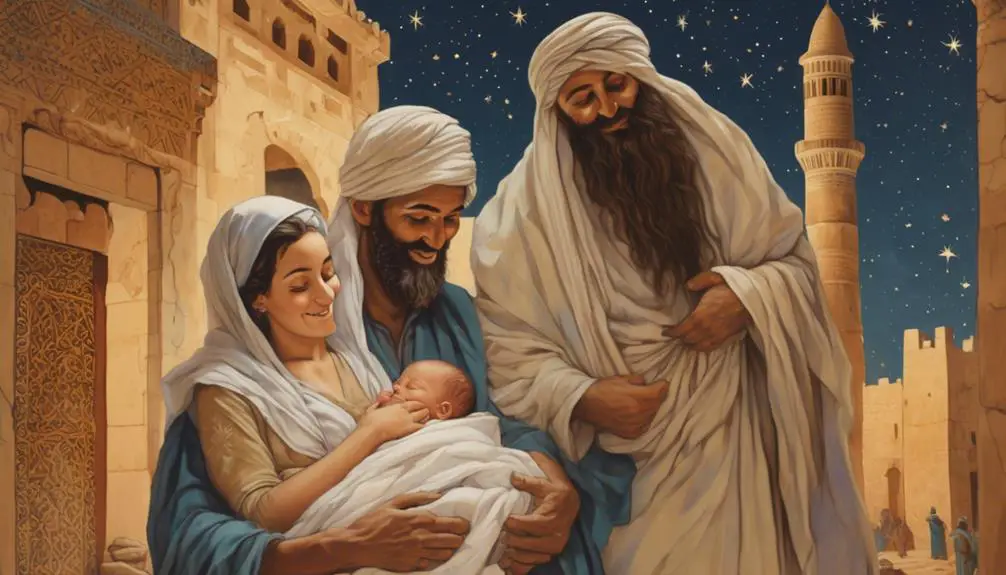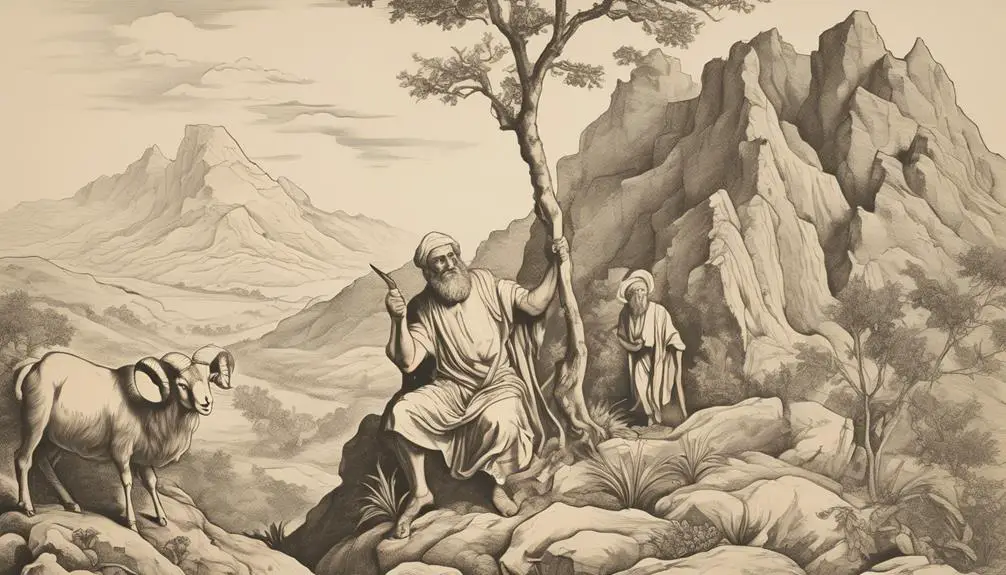Kickstart your biblical journey with a deep dive into Abraham's life, a story of faith and promise that shaped history; what secrets will you uncover?

Bible Study – Learning About Abraham
Just as you’ve picked up this discussion on Abraham, a revered figure in three of the world’s major religions, you’re embarking on a journey that will take you back thousands of years, to the origins of faith itself.
This isn’t just a story of a man, but of a covenant, a promise that shapes the lives of billions around the globe to this day. You’ll learn about Abraham’s calling, his unwavering faith, and his trials and tribulations that transformed him into a spiritual icon.
Now, wouldn’t you like to know how one man’s life could have such profound and lasting impacts?
Key Takeaways
- Abraham’s early life was marked by exposure to polytheistic practices, but he received a divine call to leave his homeland and embark on a journey to an unknown land.
- The covenant between God and Abraham signified a radical shift from polytheism to monotheism, with promises of becoming a great nation and receiving divine protection and favor.
- The birth of Isaac to Abraham and Sarah was a testament to the fulfillment of God’s promises, and Abraham’s unwavering faith and obedience were tested when God commanded him to sacrifice Isaac.
- Abraham’s faith remained steadfast throughout his later years, as he ensured the continuity of God’s promises by securing a worthy burial place for Sarah and arranging Isaac’s marriage to Rebekah. His legacy as the father of faith in Christianity and as a prophet and friend of Allah in Islam continues to have a profound impact on the spiritual landscapes of entire civilizations.
Abraham’s Early Life

Often overlooked, Abraham’s early life plays a pivotal role in understanding his profound influence and the monumental journey he undertook. Born into a family with Chaldean origins, Abraham’s ancestry was rooted in a society known for its advanced civilization and rich culture. This period of his life, critical in shaping his future decisions, is replete with lessons that you can draw from.
Your exploration of Abraham’s early life leads you to the city of Ur, a prominent Chaldean city. It was here that Abraham first encountered the polytheistic practices prevalent during that era. These experiences undeniably stirred a discord within him, urging him to question the validity of such beliefs.
Being of Chaldean ancestry, Abraham was likely privy to the profound scientific and mathematical knowledge that this civilization had amassed. This intellectual exposure might’ve bolstered his inherent questioning nature, leading him to challenge the accepted norms of his society. You can’t overlook the possibility that this environment contributed significantly to his spiritual awakening and subsequent monotheistic faith.
Delving into Abraham’s early life, you should note that it wasn’t merely his ancestry and origins that defined him. His personal decisions and actions, guided by his experiences and learnings, carved out his unique path. His journey from a polytheistic Chaldean society to becoming the progenitor of monotheistic religions emphasizes the transformative power of self-determination and critical thinking.
The Call of Abraham

How did Abraham, a man born into a polytheistic society, come to receive a divine call that would radically shift his religious beliefs and transform the course of history? The answer lies in the events that led to Abraham’s migration, as described in the book of Genesis.
According to Genesis 12:1-4, Abraham, then known as Abram, was living in Ur of the Chaldeans when he received a divine call. God commanded him to leave his homeland, his father’s house, and journey to a land that God would show him. This imperative for Abraham to abandon his familiar surroundings wasn’t without a promise. God assured Abraham that he’d make him a great nation, bless him, make his name great, and that he’d be a blessing to others.
Abraham, despite the potential uncertainties and challenges of such a journey, obeyed. His obedience marked the beginning of Abraham’s migration, a significant event in biblical history. This migration wasn’t just a geographical move but represented a spiritual shift from polytheism to monotheism.
Divine guidance became integral in Abraham’s journey. He trusted in God’s promise, and even though the exact destination was unknown to him, he, along with his wife Sarai and his nephew Lot, set out for Canaan. This act of faith would set the precedent for a covenant relationship between God and Abraham’s descendants.
Herein lies the significance of the call of Abraham: it’s not just about his migration, but also about his radical shift in faith and his reliance on divine guidance. This divine call and Abraham’s response are critical in understanding the origins of monotheism and the formation of the Abrahamic religions.
Abraham’s Covenant With God

Delving deeper into Abraham’s life, we encounter the pivotal moment of his covenant with God, a defining event that further solidified his radical shift from polytheism to monotheism. The covenant’s significance lies not only in its theological implications but also in its cultural and historical context. Most importantly, it marks a profound transformation: Abraham’s leap of faith from worshipping multiple gods to recognizing and serving only one, the God of Israel.
The covenant unfolded in a series of divine promises, each amplifying the bond between Abraham and God. Firstly, God promised to make Abraham the father of a great nation, a promise of abundant progeny that seemed impossible considering his and Sarah’s advanced age. Secondly, God pledged to bless Abraham and make his name great, ensuring his legacy would endure. Lastly, God promised to bless those who blessed Abraham and curse those who cursed him, a promise of divine protection and favor.
In return, Abraham was to remain faithful and obedient to God, marking the beginning of a covenantal relationship based on mutual commitment. Herein lies the heart of the covenant: it wasn’t a one-sided decree, but a reciprocal agreement, emphasizing the active participation of both parties.
You can see that the covenant with Abraham isn’t just a story, but a critical theological tenet. It symbolizes the relationship between God and humanity, characterized by divine promises and human faithfulness. It’s an enduring legacy that shapes our understanding of God’s commitment to His people and their reciprocal responsibility to Him.
The Birth of Isaac

Following the covenant, a significant event further underscored Abraham’s faith and the fulfillment of God’s promises – the miraculous birth of Isaac. You see, Abraham and Sarah were both well advanced in years, far beyond the natural child-bearing age. Yet, in keeping with His promise, God blessed them with a son, Isaac, a miracle that served as a testament to the omnipotence of God.
The birth of Isaac wasn’t just a fulfillment of God’s promise to Abraham and Sarah; it was a pivotal moment in the biblical narrative. Isaac’s upbringing was characterized by his father’s unwavering faith and obedience to God. The environment that Abraham fostered for his son was deeply rooted in the principles of righteousness, further strengthening Isaac’s faith and shaping his destiny.
Sarah’s joy was unparalleled when Isaac was born. The Bible notes that Sarah declared, ‘God has made laughter for me; everyone who hears will laugh over me’ (Genesis 21:6). Her statement is profoundly emotional and spiritual, indicating her overwhelming happiness and gratitude towards God. This joy wasn’t only due to the birth of a long-awaited son but also the assurance that God was faithful to His promises.
In an analytical sense, the birth of Isaac symbolized the fruition of God’s promise and the establishment of a covenantal lineage. It highlighted Abraham’s faith, the power of God, and the joy of Sarah. It served to cement Abraham’s legacy and set the stage for Isaac’s future role in the continuation of God’s covenant. This miracle birth, therefore, is a cornerstone in understanding Abraham’s journey of faith.
Test of Faith: Isaac’s Sacrifice

As you journey further into Abraham’s narrative, you’ll encounter one of the most profound and challenging episodes of his faith journey – the commanded sacrifice of his son, Isaac. This episode, fraught with moral dilemmas and a test of parental love, stands as a pivotal moment in the Bible’s exploration of faith and obedience.
The narrative in Genesis 22 recounts God’s command to Abraham to sacrifice Isaac, his son of promise. This request seems to contradict God’s earlier promise to Abraham, creating a moral dilemma. How could God, who promised to make Isaac the progenitor of a great nation, now demand his life? This apparent inconsistency triggers a profound crisis of faith for Abraham.
Despite the agony of this decision, Abraham demonstrates unyielding obedience to God. He prepares to sacrifice Isaac, putting his faith in God above his parental love. This act is often interpreted as an ultimate test of Abraham’s faith, his willingness to surrender his most precious possession – his son.
However, this narrative also offers a lens through which to examine the nature of parental love. Abraham’s willingness to sacrifice Isaac forces us to consider the extent of his love for his son in light of his devotion to God. It raises the question – does his obedience to God diminish or elevate his love for Isaac?
In the end, God spares Isaac, providing a ram for sacrifice instead. This dramatic turn of events reaffirms God’s promise and underscores the depth of Abraham’s faith. Through this narrative, we gain insight into the complex, often challenging dynamics of faith, obedience, and love in the biblical world.
Abraham’s Later Years

Turning our attention now to Abraham’s later years, you’ll find his enduring faith and obedience continuing to shape his life and decisions, setting forth a compelling example of biblical devotion. Even when faced with the loss of his beloved wife Sarah, Abraham’s faith remained unwavering. Sarah’s influence, as the matriarch of the family, was a significant force in Abraham’s life. After her death, he continued to honor her by securing a worthy burial place, showcasing not only his love for his wife but his respect for her standing.
Abraham’s later years were also marked by his continual commitment to ensuring the continuity of God’s promises. He was concerned about the lineage of his descendants, and so he arranged for his son Isaac to marry within their faith. This resulted in Isaac’s marriage to Rebekah, further solidifying the fulfillment of God’s covenant.
When examining Abraham’s death, it’s important to note that he died at a good old age, having lived a full and satisfying life. His sons Isaac and Ishmael buried him in the cave of Machpelah near Mamre, in the field Abraham had purchased as a burial site for Sarah. This act of burial not only signifies respect for Abraham but also emphasizes the culture’s value for ancestral lineage and continuity.
Legacy of Abraham in Religion

In examining the profound impact of Abraham’s life, you can’t overlook his enduring legacy in the realm of religion, which has left an indelible mark on Judaism, Christianity, and Islam. These three world religions, often referred to as the Abrahamic Religions, identify Abraham as a foundational figure in their belief systems. His faith, obedience, and commitment serve as a spiritual paradigm, inspiring millions over millennia.
Abraham’s Descendant Blessings, promised by God, have been interpreted differently across these religions, but they all agree on their influence. For Jews, Abraham is the forefather of the Israelites, with the covenant established with him paving the way for the formation of the Jewish nation. His willingness to sacrifice Isaac, his son, is revered as the ultimate act of faith.
Within Christianity, Abraham is recognized as the ‘father of faith’ and his obedience to God is seen as a testament to the importance of faith in God’s promises. Paul’s writings in the New Testament further emphasize Abraham’s faith, positioning him as a model for Christians to emulate.
In Islam, Abraham, or Ibrahim, is labelled as a prophet and the friend of Allah. His unwavering monotheism and his willingness to submit to God’s will, even at the cost of his son, play a pivotal role in Islamic teachings.
In essence, Abraham’s legacy transcends religious boundaries, his life and faith serving as a cornerstone in understanding the Abrahamic religions. This enduring influence underscores the profound impact that a single individual’s faith can have on the spiritual landscapes of entire civilizations.
Conclusion
In summarizing Abraham’s life, you’ve journeyed through his early years, divine call, covenant, and the birth and near-sacrifice of Isaac. You’ve seen his unwavering faith, even in later years, shaping his legacy in religion.
His story serves as a foundational pillar in Christianity, Judaism, and Islam. Through studying Abraham, you gain valuable insights into faith, obedience, and covenant relationship with God.
His life challenges you to reflect deeply on your own faith journey.



Sign up